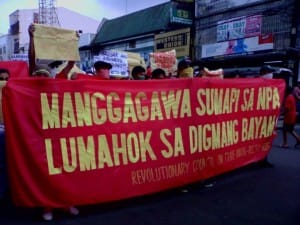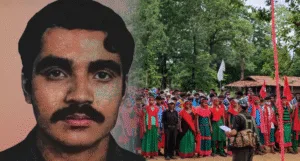By FIDEL V. AGCAOILI
Co-Chairman, Joint Monitoring Committee
Comprehensive Agreement on Respect for Human Rights
and International Humanitarian Law
The Comprehensive Agreement on Respect for Human Rights and International Humanitarian Law (CARHRIHL) signed in 1998 between the Government of the Republic of the Philippines (GRP) and the National Democratic Front of the Philippines (NDFP) provides for the creation of the Joint Monitoring Committee (JMC) and the Joint Secretariat (JS).
By FIDEL V. AGCAOILI
Co-Chairman, Joint Monitoring Committee
Comprehensive Agreement on Respect for Human Rights
and International Humanitarian Law
The Comprehensive Agreement on Respect for Human Rights and International Humanitarian Law (CARHRIHL) signed in 1998 between the Government of the Republic of the Philippines (GRP) and the National Democratic Front of the Philippines (NDFP) provides for the creation of the Joint Monitoring Committee (JMC) and the Joint Secretariat (JS).
The JMC is tasked to monitor the implementation of the CARHRIHL while the JS acts as its administrative and technical staff. The JMC and the JS are composed of an equal number of nominees recommended respectively by the GRP and the NDFP.
As of 8 May 2006, the JMC through the JS has received 799 complaints of alleged violations of human rights and international humanitarian law. 693 of these complaints are against the forces of the GRP and 106 against the forces of the NDFP. The CARHRIHL stipulates that these complaints shall be investigated jointly by the JMC and separately by the GRP and the NDFP in accordance with their respective processes.
The CARHRIHL also stipulates that, in the performance of its tasks, the JMC “shall meet every three months and as often as deemed necessary by the co-chairpersons”. However, since its last meeting on 15 April 2004, the JMC has not met again. The GRP has refused any JMC meetings until the resumption of formal talks which the GRP itself has suspended. Moreover, the implementation of the CARHRIHL is not dependent on the formal talks of the peace negotiations. Thus, the JMC has not conducted any joint investigation of the abovementioned complaints.
Meanwhile, the JS continues to receive complaints of alleged violations of human rights and international humanitarian law. It is now entering its 3rd year of operations with the support and assistance of the Royal Norwegian Government (RNG) coursed through the Center for Humanitarian Dialogue (CHD), a Swiss-based organization.
Since 2001, human rights violations have escalated with impunity. These have become worse than during the Marcos martial law period, especially in brutality and brazenness. Even the JS itself and its staff have not been spared from threats and attacks, despite the fact that the JS is part of the joint mechanism of the GRP and NDFP in the implementation of the CARHRIHL.
Only last week, the head of the NDFP-nominated section, Marissa P. Dumanjug-Palo, was trailed by four helmeted men in two motorcycles. Earlier, another NDFP-nominated member of the JS, Irein M. Cuasay, was threatened with arrest on trumped-up charges of libel. In February and March 2006, attempts were made by the GRP Department of Justice (DOJ) to serve subpoena at the JS offices against 13 persons charged with rebellion.
These GRP violations of the CARHRIHL are compounded not only by the escalating violations of human rights, but also by its continuing non-compliance of provisions in the CARHRIHL that call for the repeal of all subsisting repressive laws, decrees and other executive issuances, such as Batas Pambansa 880 (used to justify the policy of calibrated preemptive response), review of GRP jurisprudence on warrantless arrest (Umil vs. Ramos, used to detain Rep. Crispin Beltran), and indemnification of the victims of human rights violations during the time of Marcos out of the monies that were turned over by the Swiss government to the Philippine National Bank in a custodianship agreement.
The GRP has not only violated and mocked the CARHRIHL, it has also practically killed the peace negotiations when, among others, it turned the list of persons covered by the Joint Agreement on Safety and Immunity Guarantees (JASIG) into a list of persons charged with rebellion, and then converting said list into an Order of Battle with the brutal assassination of Sotero Llamas (number 15) on 29 May 2006 and the abduction and disappearance of Philip Limjoco (number 23) on 8 May 2006.
Had it been operational to carry out its tasks, the JMC could have been of value to both the GRP and the NDFP. But the Macapagal-Arroyo regime is determined to scuttle the peace negotiations, adopting a militarist solution to the armed conflict after conniving with the US and the European Union in the “terrorist listing” of the CPP/NPA and Prof. Jose Maria Sison in August 2002.
The members of the NDFP in the JMC hold the Macapagal-Arroyo regime responsible for the escalating violations of human rights and the scuttling of the peace negotiations.





